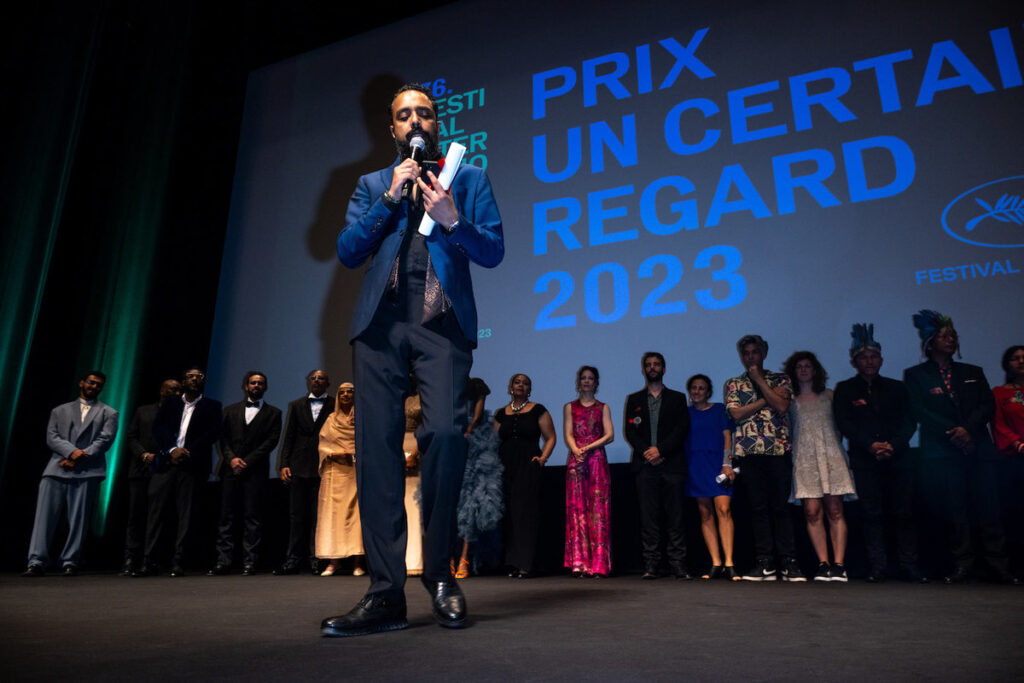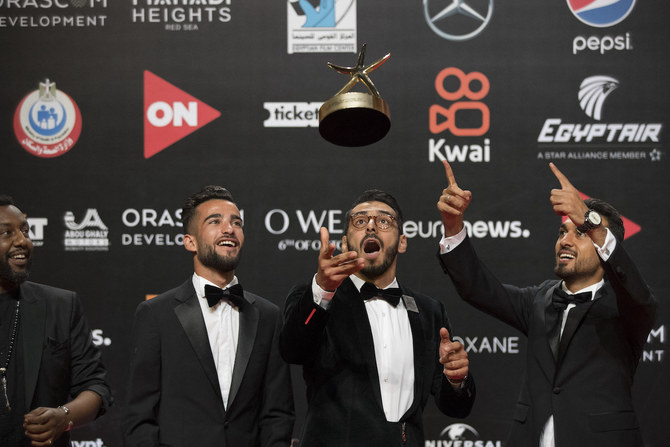The Sudanese filmmaker gave up a comfortable career in Bahrain to make movies that could shed light on his homeland’s deep divides. He’s now a Cannes award-winner .
Great art often raises more questions than answers. In the case of “Goodbye Julia,” the Saudi-backed film that won the first-ever Freedom Award at the Cannes Film Festival last month, those questions were born in a single historic moment.
It was February 7, 2011, and Sudanese filmmaker Mohamed Kordofani was sitting with his family in Khartoum as they read out the results to the South Sudanese independence referendum. His country was quite literally split in two and, as his shock turned to shame, a long search for truth began — one that would upend his entire life and turn him into one of the region’s most promising storytellers.
“Something sparked inside of me. Why would 99 percent of a whole nation vote to separate? I couldn’t fathom it, and I began to question everything — about my society, my upbringing, and even myself,” Kordofani tells Arab News.
“I was brought up in a typical Eastern Sudanese household, and the traditions and norms I inherited from previous generations made me think that racism was just a normal part of life. I hadn’t realized the true damage that everyday hate could cause. I had been so confident in my ignorance. I told myself, ‘No more.’ And I’m a better person now because of it,” he continues.
Truth be told, Kordofani had never wanted to be a filmmaker. In fact, at the time of the secession, he was working in Bahrain as an aircraft engineer, settled in a seemingly comfortable life in which he could safely start a family. He was never a cinephile and had no great interest in the artform. But as he wrestled with the deep flaws within himself and his home country, his ideas began to take narrative shape.
“It’s funny to me that I found myself at Cannes when I didn’t come from a cinema background like so many of my peers. I have impostor syndrome about this — wondering why I’m here when so many others are not. Growing up, I watched movies like everyone else, sure, but that was it,” says Kordofani. “I wrote stories for myself in university, but no one would ever read what I wrote. I didn’t know anything about cinema, but I chose filmmaking because I realized it was a tool I could use to tell my stories to biggest audience possible.”
For years, Kordofani led a double life. He would use his annual leave and dip into his savings to make short films, screening them for the local community to great acclaim before traveling back to his workaday life in Manama. By 2020, he realized he had to make a choice: continue with the life that had been prescribed him, or follow what had become his passion. He chose the latter.
“When you’re married and have kids, switching careers can be very scary, but, honestly, I was miserable,” he says. “I said, ‘You only live once’ and, at age 37, I left engineering behind to start a production company at a time when there was no film industry in Sudan. I burned all my bridges, cancelled my engineering license, and put myself on a new path.”
By that time, his efforts to make “Goodbye Julia” were well underway. The idea had come to him at home in Bahrain one night, as he and his wife argued over whether they should get a live-in maid to help around the house. The idea repulsed Kordofani.
“I thought the whole setup was unfair. These people work for a long time, often have no off-days, and it all sounded to me like slavery. It took me back to growing up in Sudan, and the help that we had around the house that wasn’t much different — always made up of people from the south of the country. It made me think back to the separation in 2011, and the plot started forming in my mind,” he explains.
The film follows two women from the north and south of Sudan respectively — Mona, a retired singer racked with guilt for causing a man’s death, and another named Julia, the man’s widow. Mona offers Julia — who doesn’t know about Mona’s involvement in her late husband’s death — a job as her maid in order to atone for her misdeeds, against the wishes of her husband Akram, who is open in his resentment of southerners.
In early drafts, Kordofani was unsatisfied with how one-dimensional all the characters felt. “I was writing with my engineering mentality,” he says. “All of them were binary — zero or one, black or white. It wasn’t until draft three or four that I actually felt I understood that the film wasn’t just about separation. I had to not only delineate their differences, but reconcile them, and reconciliation is about understanding.
“I had to learn to stop judging them, and empathize. That was not hard to do, because they are me,” he continues. “Each of them, from the conservative husband Akram to the socially progressive wife Mona, were a reflection of my own points of view at one time in my life or another, back when I felt I was a victim of my society. And they turned from black-and-white to gray, and that turned them into a good catalyst for dialogue.”
As his script progressed, Kordofani began pitching the film internationally, but found that the predominantly white decisionmakers couldn’t fathom the racial divide of his home nation.
“In one pitch session in Portugal, the first question was, ‘I don’t understand. You are black. And the southerners are black as well. So you’re talking about black-on-black racism? How does that work?’ I responded, ‘Yeah, if this were a comedy, we’d call it “50 Shades of Black,”’ Kordofani says wryly.
The film has found instant success coming off its Cannes debut — it is the first Sudanese film ever to screen at the storied festival — scoring big deals for theatrical releases in countries across the world. Ultimately, though, Kordofani made the film with Sudanese audiences in mind.
After all, part of the reason that he imbued the film with so much complexity — why he asks hard questions without reaching for easy answers — is that he wants to inspire discussion in Sudan, hoping to bridge the divides that continue to plague the country as it verges on a civil war that Kordofani believes is caused by the same underlying social illness as the 2011 secession was.
“We’re a divided people. Political division, ethnic division, and tribal division have always been the root cause of all our problems,” he says.
Kordofani, meanwhile, has begun to accept that he truly is a filmmaker, and a stamp of approval from Cannes could mean he’ll be able to tell stories for the rest of his life. He’s come to terms with the fact that he doesn’t have the answers, whether in politics or his art, and that his journey to find them will continue for years to come. Indeed, accepting his own imperfections may be the big answer he was always looking for.
“When I finished the final scene, I cried so much. We were we were on a bus from Kosti to Khartoum, a five-hour ride, and I think I cried the whole ride,” he says. “It hit me that my intention was to make a film that may change people. And I found out that I was the one who was changed the most by making this film. I feel I finally understood myself.”
source/content: arabnews.com (headline edited)
___________

__________
SUDAN
